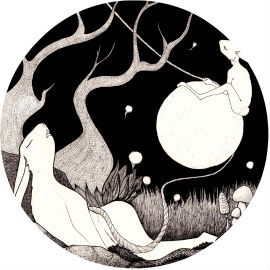
‘Sonata’ by Christian Schloe
There are an enormous number of general empirical propositions that count as certain for us. One such is that if someone’s arm is cut off it will not grow again (L Wittgenstein, On Certainty)
There were nine of them to begin with. Children, that is. Ten, if you count poor Dora, dead before she began. There were seven grand pianos. (Fewer pianos than pianists to play them). Five girls and five boys, each golden. Each enchanted. Four of them doomed. Five, if you count that arm that will not grow again.
Dora, as you already know, died at birth (1876 -1876). There is little that can be said. Her musical talents, her ear for chords, her wit or beauteous temperament, her kindness or cruelty, remain unknown.
Hans (1877-1902), the oldest of the boys, went to America and disappeared at sea. The first word he ever spoke was, they say, ‘Oedipus’. Once, when walking in the park with his sister Hermine, he had tried to imagine a pavilion made of diamonds, but could only imagine it in miniature. ‘I cannot continue,’ he said. ‘I cannot imagine my diamond pavilion any bigger than this. Can you?’
‘Of course,’ Hermine answered, ‘what is the problem?’
‘Well,’ Hans replied, ‘there is no money left to buy any more diamonds.’
He went canoeing in Chesapeake Bay and was never seen again. Or he went on a boat. Or there was a gun. It took a year for the family to accept that he had died. That he was never coming home.
Rudi (born in 1881) was 22 years old when he went to a bar in Berlin and asked the pianist to play Verlassen, verlassen, verlassen bin ich. Imagine him in the modern ballet version of the family’s life, in black tights, gleaming like leather, shirtless and effete. Camp as a row of tents, he gestures towards his lover’s grave and drinks his milk and cyanide. (Did I mention that Hans, too, was queer? Well, what did you expect?)
Kurt (1878-1918), an officer, spent most of the war in Göding, where:
to the far-off colourless sky there ran long empty boulevards lined by large poplars, rising so disproportionately large and sad, but for all that I have often have a feeling of unutterable, asphyxiating solitude …
The oldest of Kurt’s sisters, Hermine, (who had once written that there was no depth to his character, “but since you don’t expect to find any, you don’t miss it either”) wrote that he ‘fell’ on 27th September, but the date is unclear. He died (according to the family’s correspondence) in either September, October or November. The troops under his command deserted him. He stood alone at the Italian front and shot himself. A clean, swift death.
(There are others: Gretl’s husband, Jerome, who shot himself in the head with a rifle. Helene who died of cancer, Helene’s daughter of cancer, Helene’s son of polio. It goes on and on and on …).
And then there is Paul, born in 1887, who did not die, but was shot in the right elbow during the first world war. He had already launched his glittering career as a concert pianist (Remember, there were seven grand pianos in the Wittgenstein home: more pianos than there were pianists to play them, in the end). His debut was bought and paid for, and held in Vienna’s incomparable Grosser Musikvereinsaal. He had a tantrum before he walked on stage, tore his sheet music into pieces and stamped his feet like a child. He was somewhere between Galicia and the Russian border when a bullet shattered his joint. It was August 1914. He was unconscious, in the field hospital, when the arm was amputated. Two months later his philosopher-brother wrote:
I keep having to think of poor Paul, who has so suddenly lost his career! How terrible. What philosophy is needed to get over it! If only this can be achieved in any other way than suicide!
But Paul was made of different, perhaps sterner, stuff. He learned, as many other amputees learned, to dress himself. To eat and wash and walk. And to play with only his left hand. His own arrangements, at times–the first was Chopin’s Revolutionary Etude–but later he commissioned work from the great composers of his day: Prokofiev and Ravel. He was fierce, and intensely self-critical. A man turned in upon himself. When, in 1931, Prokofiev sent him the score for his Fourth Piano Concerto, Paul wrote back:
Thank you for the concerto, but I do not understand a single note in it, and I will not play it.

No Comments